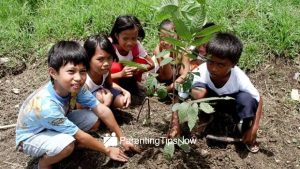Table of Contents
ToggleAs the saying goes, it takes a village to raise a child, and in the Philippines, community spirit runs deep within its cultural fabric. This intrinsic sense of solidarity is exemplified through various acts of prosocial behavior that Filipino parents can incorporate into their parenting approach. By exploring these 12 heartwarming examples, we delve into the rich tapestry of Filipino values that emphasize the interconnectedness of all beings and inspire future generations to make positive contributions towards building a more compassionate world.
What Exactly is Prosocial Behavior?
Prosocial behavior is a concept that goes beyond simply being polite or kind; it involves actively seeking to benefit others and promote well-being in society. This can manifest in various forms, such as volunteering, sharing resources, supporting friends in times of need, or showing compassion towards strangers. Prosocial actions are driven by empathy and a genuine desire to make a positive impact on others’ lives.
In the context of Filipino culture, prosocial behavior holds significant value as it aligns with the traditional values of bayanihan (community cooperation) and pakikisama (harmonious relationships). Parents play a crucial role in modeling and encouraging prosocial behaviors among their children, shaping future generations who prioritize the welfare of others. By nurturing an environment that fosters empathy and kindness, Filipino parents can instill lifelong values of compassion and generosity in their children.

Understanding Prosocial Behavior in Filipino Culture
Within Filipino culture, prosocial behavior is deeply entrenched in the concept of bayanihan, which signifies communal unity and cooperation. This innate sense of togetherness encourages Filipinos to extend help and support to those in need without hesitation. The practice of pakikisama, or social harmony, also plays a crucial role in fostering prosocial behavior by emphasizing the importance of working together for the greater good.
Filipinos often showcase prosocial behaviors through acts of generosity, such as lending a helping hand to neighbors during times of need or participating in community-driven initiatives to address social issues. Additionally, the emphasis on respect for authority figures and elders promotes a culture of empathy and compassion towards others. These cultural values not only strengthen social bonds but also contribute to building a compassionate and supportive society where individuals prioritize the welfare of others above their own interests.

Overview of Examples of Prosocial Behavior in the Philippines
In the Philippines, acts of prosocial behavior are deeply ingrained in the cultural fabric, showcasing the selfless nature of its people. One notable example is Bayanihan, a communal spirit where neighbors come together to help someone in need, such as in rebuilding a house after a natural disaster. This cooperative effort highlights the Filipino value of unity and social support in times of adversity.
Another striking demonstration of prosocial behavior in the Philippines is seen during calamities or emergencies, where individuals extend their help without hesitation to those affected. From donating relief goods to volunteering towards rescue missions, Filipinos exemplify compassion and solidarity towards their fellow countrymen during trying times. Such collective action not only provides immediate aid but also fosters a sense of community resilience and unity amidst challenges.
Prosocial Behavior Example 1: Teaching Empathy: Nurture kindness towards others
Instilling empathy in children is crucial for nurturing kindness and promoting prosocial behavior. One powerful way to teach empathy is by encouraging children to put themselves in others’ shoes and consider how their actions may impact someone else. Parents can model empathetic behaviors through active listening, showing compassion, and being supportive during difficult situations. By demonstrating the importance of empathy, children are more likely to develop a deeper understanding of others’ emotions and perspectives.
Empathy not only fosters better relationships but also helps children navigate conflicts and communication effectively. Teaching children the value of empathy from a young age can lay the foundation for them to become caring and considerate individuals as they grow older. As parents, it’s essential to create opportunities for children to practice empathy, whether through volunteering, role-playing scenarios, or engaging in discussions about different emotions and experiences. By prioritizing empathy in parenting practices, Filipino parents can raise socially responsible individuals who contribute positively to society with their kind-hearted actions.

Prosocial Behavior Example 2: Sharing and Generosity: Encouraging selflessness at home
Encouraging sharing and generosity within the Filipino family is a powerful way to nurture prosocial behaviors in children. In Filipino households, parents can set an example by sharing with their children and modeling acts of selflessness. By teaching kids to donate toys they no longer use or inviting them to participate in charitable activities, parents instill a sense of empathy and compassion early on.
Creating opportunities for children to experience the joy that comes from giving can have long-lasting effects on their development. Encouraging siblings to share toys or snacks without being prompted fosters a spirit of cooperation and teamwork. Parents can reinforce these behaviors by praising acts of kindness and highlighting the positive impact generosity has on others’ well-being.

Prosocial Behavior Example 3: Acts of Service: Modeling helpful behavior for children
Modeling acts of service is a powerful way to instill prosocial behavior in children. When parents engage in acts of service, such as volunteering, helping a neighbor, or participating in community projects, children learn the value of giving back and helping others selflessly. By witnessing these actions firsthand, children are more likely to internalize the importance of being kind and helpful towards others.
Furthermore, involving children in acts of service provides them with firsthand experience in making a positive impact on their community. This hands-on approach allows children to develop empathy and compassion towards those in need. It also fosters a sense of responsibility and teaches them that small actions can have significant outcomes. Parents who model acts of service are not only shaping their children’s behavior but also creating a more caring and empathetic generation for the future.

Prosocial Behavior Example 4: Respect for Elders: Upholding traditional values through actions
In the Philippines, respect for elders is deeply ingrained in the cultural fabric of society. This value goes beyond mere words; it is demonstrated through actions that honor and uphold the wisdom and experience of older generations. Children are taught from a young age to show reverence to their elders by greeting them with po and opo, using respectful language, and engaging in acts of service to assist them in daily tasks.
Filipino parents play a pivotal role in instilling this value in their children by serving as role models who exemplify respect towards seniors. By observing their parents’ interactions with elders, children learn the importance of acknowledging the contributions and authority of older individuals within the community. This practice not only fosters intergenerational solidarity but also ensures that traditional values are preserved and passed down through generations, contributing to a harmonious and respectful society.

Prosocial Behavior Example 5: Community Involvement: Fostering a sense of belonging
Community involvement is a powerful example of prosocial behavior that can foster a sense of belonging among individuals. By actively participating in community projects, events, or initiatives, Filipino parents can instill a strong sense of connection and unity within their families. This involvement not only benefits the larger community but also provides opportunities for parents to model altruistic behavior and values to their children.
Engaging in community activities allows families to broaden their social networks and develop meaningful relationships with others who share common interests and values. This sense of belonging can contribute to increased feelings of happiness, fulfillment, and overall well-being for both parents and children alike. It reinforces the idea that a strong community support system is essential for individual growth and prosperity, highlighting the importance of giving back to society as an integral part of one’s identity.

Prosocial Behavior Example 6: Compassion for Others: Showing care and concern consistently
Compassion for others is a profound example of prosocial behavior that transcends boundaries and cultures. In the Filipino context, showing care and concern consistently is deeply ingrained in the cultural fabric, especially when it comes to familial relationships. This display of compassion extends beyond immediate family members and encompasses neighbors, friends, and even strangers who are in need. The act of lending a helping hand or offering support without expecting anything in return exemplifies the essence of Filipinos’ altruistic nature.
Moreover, maintaining a sense of compassion for others teaches valuable lessons to children about kindness, empathy, and understanding. By witnessing acts of compassion from their parents or caregivers towards others, children learn the importance of social responsibility and community involvement. Cultivating these qualities from a young age paves the way for creating a more compassionate society where individuals look out for one another with genuine care and concern. In essence, showing consistent compassion towards others not only benefits those receiving support but also creates ripple effects that contribute to building stronger bonds within communities.

Why Prosocial Behavior Matters in the Philippines
Prosocial behavior is crucial in the Philippines as it fosters a sense of community and togetherness among its people. In a country where family ties are strong and social connections hold great importance, engaging in prosocial activities strengthens these bonds and promotes collective well-being. Whether it’s helping a neighbor in need or participating in community projects, every act of prosocial behavior contributes to the overall harmony and stability of Filipino society.
Moreover, practicing prosocial behavior sets a positive example for future generations. By instilling values of kindness, empathy, and generosity in children from a young age, Filipino parents can raise individuals who are not only compassionate towards others but also actively seek out opportunities to make a difference in their communities. The ripple effect of such upbringing can lead to a more caring and supportive society where individuals are willing to go above and beyond for the greater good.

Factors Influencing Prosocial Behavior Among Filipinos
One significant factor that influences prosocial behavior among Filipinos is the strong sense of community and interconnectedness that is deeply ingrained in their culture. In Filipino society, there is a prevailing emphasis on the concept of bayanihan, which promotes mutual assistance and cooperation within the community. This communal spirit fosters a natural inclination towards helping others in need and promoting collective well-being.
Additionally, religious beliefs play a crucial role in shaping prosocial behavior among Filipinos. The predominantly Catholic population of the Philippines often values altruism, compassion, and generosity as important virtues instilled through teachings and practices within their faith. These moral values are reflected in everyday actions, such as volunteering, charity work, or simple acts of kindness towards others in their communities. Ultimately, these cultural and religious factors contribute to a pervasive culture of empathy and concern for others among Filipinos, driving them to engage in prosocial behaviors that benefit not only individuals but society as a whole.

Benefits of Engaging in Prosocial Acts
Engaging in prosocial acts not only benefits others but also has a positive impact on our own well-being. Research suggests that performing acts of kindness and generosity can lead to increased happiness, reduced stress levels, and enhanced social connections. These benefits are especially crucial in today’s fast-paced society, where feelings of isolation and loneliness are prevalent.
Furthermore, engaging in prosocial behavior helps cultivate a sense of purpose and meaning in life. By contributing to the well-being of others, individuals can experience a sense of fulfillment and accomplishment that goes beyond personal gain. This can lead to greater satisfaction with life as a whole and foster a deeper sense of community and connectedness among individuals. The ripple effect of these actions can create a more compassionate and supportive society for everyone.

Ways to Cultivate Prosocial Behavior in Filipino Teens
One effective way to cultivate prosocial behavior in Filipino teens is by fostering a sense of empathy and compassion towards others. Encouraging teenagers to put themselves in the shoes of their peers or community members can help them develop a deeper understanding of different perspectives and experiences. By promoting empathy, teens are more likely to engage in acts of kindness and support for others, leading to a more positive and cooperative society.
Additionally, providing opportunities for Filipino teens to participate actively in volunteer work or community service can significantly promote prosocial behavior. Engaging teenagers in meaningful ways to give back to the community not only instills a sense of responsibility and altruism but also helps them develop important social skills such as teamwork, communication, and problem-solving. Through hands-on involvement in helping others, teens are able to see the direct impact of their actions and feel a sense of fulfillment that reinforces their prosocial tendencies.
Summing Up: Emphasizing the Importance of Prosocial Behavior for Filipino Parents
As we come to the end of our exploration of prosocial behavior for Filipino parents, it becomes evident that cultivating these values within families is not just a choice but a necessity. Prosocial behaviors such as empathy, generosity, and kindness serve as the cornerstone for fostering strong family bonds and creating a positive environment for children to thrive. By emphasizing these traits, parents can instill in their children the importance of community, compassion, and cooperation.
In a society where individual success is often put on a pedestal, it is crucial for Filipino parents to prioritize prosocial behavior in their parenting approach. By modeling acts of kindness and selflessness, parents can guide their children toward becoming empathetic individuals who are attuned to the needs of others. This emphasis on prosocial behavior not only benefits the immediate family unit but also contributes positively to the larger community by creating a generation of caring and responsible citizens.














